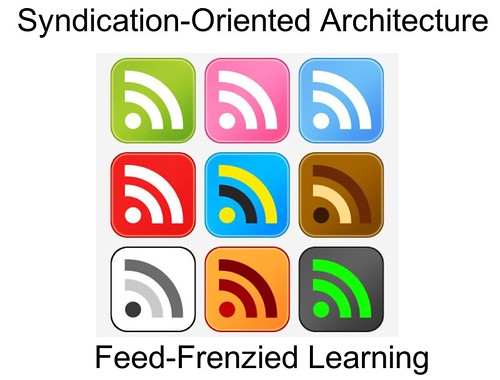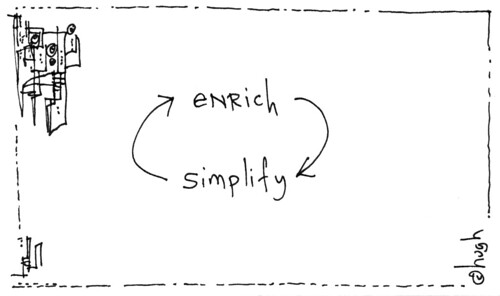SPTJ

Small Pieces... Thoughtfully Joined?
The process is like a transparent layering of key ideas that are taken up again and contextualized anew.
from: The Technology of Collage
"...developing an open source publishing platform ...to gradually integrate into the school’s general education curriculum the deep, critical examination of how digital tools are changing the way we think and live."
from: Luke Waltzer
The Life and Times of a Resource
Here's how we are using one overview of social web tools for elearning.
- This overview is actually made up of a set of smaller, more specific web pages.
- Based on how the URL is constructed, it is automatically indexed heirarchically on pages listing documentation and social web tools.
- It is also categorized in folksonomic fashion via in-text tags for elearning resources and resources.
- Via a WordPress plugin we developed, it is syndicated on Brian's blog, on an elearning resources site (with tabbed layout), and on a student resource site (which also has embed code and other goodies to enable sharing).
- The source wiki page also has an "Embed Page" link which allows it to be syndicated inside WebCT Vista (or most other HTML environments) via cut-and-paste code.
- It can also be downloaded as a cleaned-up PDF, either standalone or as part of a larger collection.
Process: the problem, the pieces and the tradeoffs
- our motivation: finding better ways to use our time and resources... More reuse, reducing duplication
- making the most of the tools we have - collaging bits together
- tensions - serendipity, openness, structure, creativity
Component One: Wiki
- CWL authentication
- private, standalone sites available HLWiki
- Namespaces for courses (example), documentation, etc... Along with categories. Feedback?
- "transclusion" - or chunking page content into tiny wiki bits (don't call them granular learning objects, please)
- Extensions include WikiBooks
Component Two: Blogs
Bloggy blogs
Notable blogs featured on home page of the site
- Courseblogs such as: http://blogs.ubc.ca/etec522/ (new version uses BuddyPress as LMS), http://blogs.ubc.ca/etec540sept09/, http://blogs.ubc.ca/span365/, http://blogs.ubc.ca/libr551/
- UBC Blogsquad - partnering with Student Services
- The Library has long been doing great things on our platform...
Sites
We're going full-blown CMS baby!
You can setup your UBC site in minutes. We support UBC's common look and feel as a theme. Partnering with Public Affairs and IT on delivering a UBC-wide CMS.
Some of our sites:
http://leap.ubc.ca, http://celc.sites.olt.ubc.ca/, http://chcm.ubc.ca/, http://earlylearning.ubc.ca/, http://act.elearning.ubc.ca/, http://strategicplan.ubc.ca/, http://aboriginal.sites.olt.ubc.ca/ (private, in development), http://thischangedmypractice.com/
WP setup
Mostly developed by wider WordPress community, but at least some bits of custom code and plugins we've developed.
- CWL authentication
- privacy controls for public, CWL-holders, or registered users (visibility and comments)
- add users via widget or via custom screen
- WikiEmbed plugin: http://frg.sites.olt.ubc.ca/ - gets its content from this wiki.
- Section Widget - WordPress Plugin Award Winner
And a fairly wide array of plugins (our admin is very good at monitoring their effects on system performance)
Component Three: The Economics of Openness
"The 'cost' of sharing has collapsed... If I come across something I share it via Google shared items, Twitter, my blog, etc. If I want to share I stick it up on Slideshare, my blog, YouTube. There is a small cost in terms of effort to me to do the sharing, and zero cost in anyone wanting to know what I share. Sharing is just an RSS feed away. - Martin Weller
If open education is seen as a high profile form of charity or foreign aid, then it is indeed a luxury item unlikely to survive the inevitable budget cuts. But...
- There is a difference between publishing open courseware and being open: "The key to understanding the value of open education is that most of the benefits accrue to the sharer, not the recipient." Create a platform where openness fuels innovation.
- "Offer faculty the opportunity to easily publish their lecture recordings and classes to the Web if they choose." Jared Stein has written up a recipe for low cost ways of doing this. We live-streamed and archived all sessions for the 2009 Open Education Conference on a shoestring, much to the delight of our unexpected attendees.
- "Facilitate and support course design where student project work is published to the Web."
UBC case study: Adventures in Wikipedia

- Murder, Madness, and Mayhem Project Page - the work of UBC Professor Jon Beasley-Murray, (Wikipedia Page, Blog)
- Article: El Señor Presidente
- The FA Team
Why does this work appeal so much?
- fast, cheap, and out of control...
- augments traditional literacy with new media literacy
- results in genuinely useful public knowledge resources (perhaps the essence of open education resources)
- students will respond to tasks that are authentic
Cheap platforms, built-in innovation
- UMWBlogs - "Two years worth of iteration and development given to Longwood in less than an hour."
- And how about MobileCourseDiscussions - open sharing in open formats reduces costs in environments we have not yet imagined...
Enterprising Edupunk
Learning lessons
- I was there when EduPunk was born. A date with Jim Groom at Freddy's (a bar which is slated for destruction, to make room for a stadium)
We talked about writing a punk-themed zine along the lines of on how to run an ed tech operation for no money. (Later we did do something like that with a different theme, the survivalist-tinged Radical Reuse).
Let's count the Edupunk vs Enterprise dilemmas that Brian and his OLT buddies argue about...
- Setup, maintenance - easy to do, not so easy to do well... economies of scale need to be thought through.
- Integration (we love UBC's central IT, we love VM, we love CWL)
- What do the pieces do? (MW as resource management vs WP as presentation tool...)
- Rigour and structure vs being light-weight and user-friendly
- Don't forget support and training (EduPunk cred ain't enough)
- Stats and reporting: who is using it and for what? Critical for making the case for the importance of service, determining trends. Who is not using it and why not? Critical for identifying barriers and improving service/support.
- Don't be afraid to say no. Though an EduPunk hero might disagree... Plugins can be a nightmare when upgrade time comes along. Custom hacks and themes also tend to age poorly during upgrades and migrations. Making someone happy now risks making them very unhappy sometime in the future.
- More here: Novak's post
The future
Lots more open source, open standards, open content, open data and hopefully open minds.
- Resource management is a growing concern: a few are experimenting with the approach we've described: UBC Library, Arts Advising.
- Continue to push the boundaries for our platforms:
- http://phylogame.org/ - assemble new image sets, or even games based on this framework: see the discussion
- one can imagine instant generation of games into any number of knowledge domains, based on open data and relational queries to sources such as Wikipedia (ahem... ALL HAIL TONY HIRST! See this tutorial on using Google Docs for open data mashing)
- Integration with BuddyPress to offer more personalization, interaction on multiple levels (friends, forums, blogs, groups) example at http://commons.gc.cuny.edu/
Many, many thanks to my wonderful collaborators and friends Cindy Underhill, Novak Rogic, not to mention the rest of our posse for contributing to this session.
License
|
|





